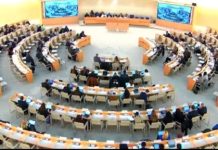By Yankuba Jallow
The ongoing criminal trial involving Mr Borry J. Saidy, the former Acting Manager of Air Traffic Services at the  Banjul International Airport, is slated for ruling on the ‘no case submission’ made by the defense Lawyer Borry S. Touray.
Banjul International Airport, is slated for ruling on the ‘no case submission’ made by the defense Lawyer Borry S. Touray.
When the matter was called before Principal Magistrate Omar Cham of the Brikama Magistrates Court, Inspector K. Gibba announced his representation for the Inspector General of Police (IGP) whilst Lawyer B.S. Touray appeared for the accused person.
Counsel Touray reminded the court that the matter was slated for him to reply on points of law on the issues raised by the prosecutor, nspector Gibba, during the last court session in his absence. “I will allow the matter to proceed with ruling,” B.S. Touray submitted.
He urged the trial magistrate to rule on the issues raised as he is going to Banjul to bring a document that will be tendered in court.
Principal Magistrate Cham adjourned the matter to 24th February, 2017 for ruling on the ‘no case submission’.
Readers could recall that defence counsel Touray applied for a ‘no case submission’, arguing that the case at hand is not a criminal matter because in criminal proceedings the law takes its course notwithstanding the change of government. He therefore submitted that the petition which generated this criminal action was addressed to Yahya Jammeh and that there is a constitutional overthrow of his government. He further argued that the accused person exercised his freedom by virtue of Section 25 (f) which gives one the right to petition the executive. “There is no law in the country which caters for citizens to petition the executive except the constitution and that there is nowhere under section 25 where this right has been derogated,” he said.
The prosecutor argued that the defendant is charged with ‘giving false to a civil servant’ contrary to Section 114 of the Criminal Code of The Gambia and that the matter started a year after the Amendment Act was enacted.
Inspector Gibba told the court that its decision is a matter of contest because the court ruled in the year 2014 against the defence’s application of ‘no case submission’ and the court has no jurisdiction to rule against its previous ruling.
In addition, he said, counsel Touray relied on Section 166 of the Constitution and thus reminded the court of its previous ruling that the office of the President, Vice President, Speaker or Deputy Speaker of the National Assembly, Secretary of state or a member of the National Assembly are all public offices. He further referred the court to the case of The State vs Abdoulie Conteh Gambia Law Report 2002 and 2008.





















